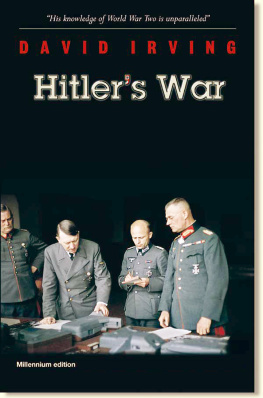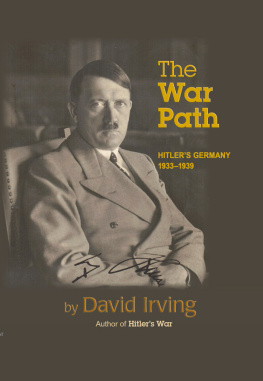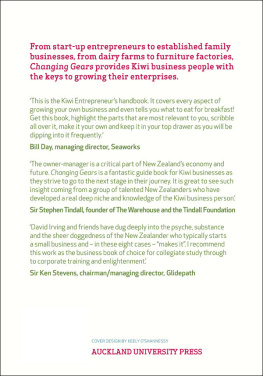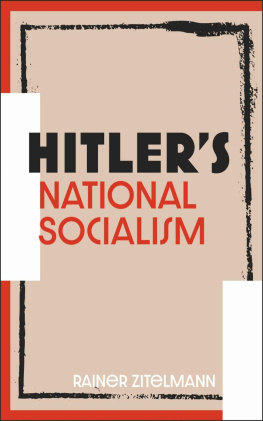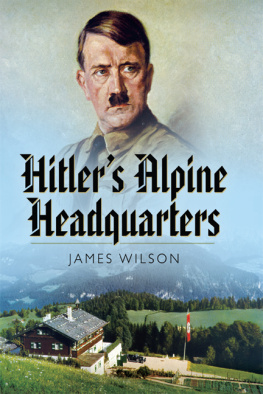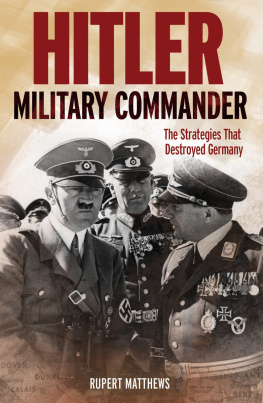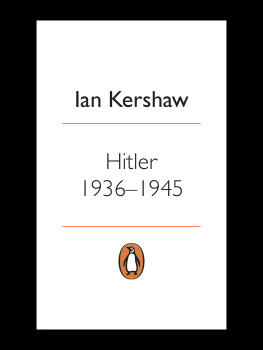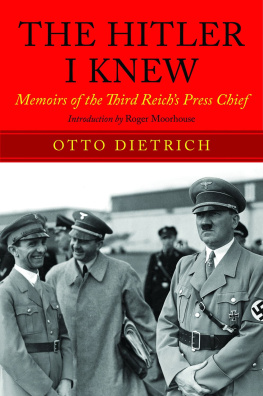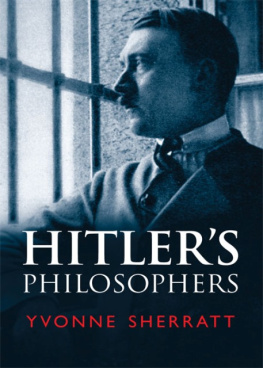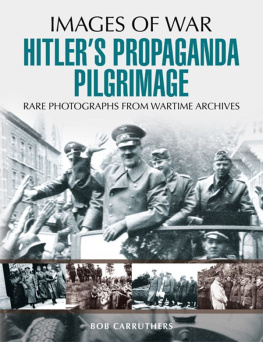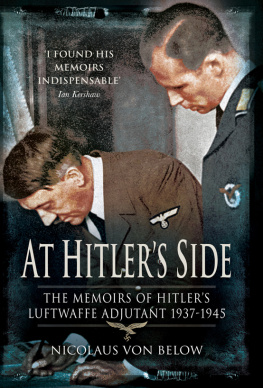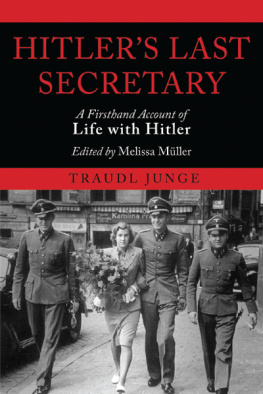David Irving
HITLER'S
WAR
and The War Path
Two books in English stand out from the vast literature of the Second World War: Chester Wilmot's The Struggle for Europe, published in 1952, and David Irving's Hitler's War
JOHN KEEGAN, Times Literary Supplement
F
FOCAL POINT
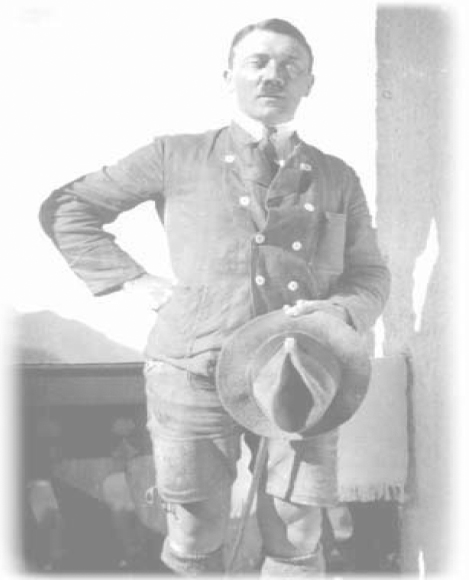
Twenty years still to go: Wealthy benefactor Lotte Bechstein took this snapshot of Adolf Hitler, then 36, at the balustrade of the villa that became the Berghof, after his release from Landsberg prison in 1925 (AUTHOR'S COLLECTION)
A Doctor quotes Hitler on Biographers, in August 1944
A FOREIGNER, said Hitler, probably finds it easier to pass judgment on a statesman, provided he is familiar with the country, its people, its language, and its archives.
Presumably, I said, Chamier didn't know the Kaiser personally, as he was still relatively young. But his book not only shows a precise knowledge of the archives and papers, but relies on what are after all many personal items, like the Kaiser's letters and written memoranda of conversations with friends and enemies.
Hitler then said that for some time now he has gone over to having all important discussions and military conferences recorded for posterity by shorthand writers. And perhaps one day after he is dead and buried an objective Englishman will come and give him the same kind of impartial treatment. The present generation neither can nor will. The Diary of Dr Erwin Giesing, on a discussion with Hitler about the Kaiser's English biographer J. D. Chamier (AUTHOR'S COLLECTION)
David Irving is the son of a Royal Navy commander. Imperfectly educated at London's Imperial College of Science & Technology and at University College, he subsequently spent a year in Germany working in a steel mill and perfecting his fluency in the language. Among his thirty books (including three in German), the best-known include HITLER'S WAR; THE TRAIL OF THE FOX: THE LIFE OF FIELD MARSHAL ROMMEL; ACCIDENT, THE DEATH OF GENERAL SIKORSKI; THE RISE AND FALL OF THE LUFTWAFFE; GRING: A BIOGRAPHY, and NUREMBERG, THE LAST BATTLE. He has translated several works by other authors including the autobiographies by Field-Marshal Wilhelm Keitel, General Reinhard Gehlen, and Nikki Lauda. He lives near Grosvenor Square, London, and has raised five daughters.
In 1963 he published THE DESTRUCTION OF DRESDEN. This became a best-seller in many countries. In 1996 he issued a revised edition, APOCALYPSE 1945, as well as his important biography, GOEBBELS. MASTERMIND OF THE THIRD REICH. A second volume of CHURCHILL'S WAR appeared in 2001 and he is now completing the third. His works are available as free downloads on our Internet website at www.fpp.co.uk/books .
for Josephine Irving
IN MEMORIAM 1963 1999

COPYRIGHT 2002
Parforce (UK) Ltd
All rights reserved. No reproduction, copy or transmission of this publication may be made without written permission. No part of this publication may be reproduced, copied, or transmitted save with written permission of the author in accordance with the provisions of the Copyright Act 1956 (as amended). Any person who does any unauthorised act in relation to this publication may be liable to criminal prosecution and civil claims for damages.
HITLER'S WAR was first published by The Viking Press (New York) and Hodder & Stoughton (London) in 1977; THE WAR PATH was published by The Viking Press and Michael Joseph Ltd in 1979. Macmillan Ltd continued to publish these volumes until 1991. We published a revised edition of both volumes in 1991. HITLER'S WAR AND THE WAR PATH has been extensively revised and expanded on the basis of materials available since then. The volume is also available as a free download from our website at www.fpp.co.uk/books .
FOCAL POINT PUBLICATIONS
Duke Street, London WIK 5 PE
British Library Cataloguing-in-Publication Data
A catalogue record for this book is available
from the British Library
Print ISBN 9781872197104
ePub ISBN 9781872197098
Mobi ISBN 9781872197081
PDF ISBN 9781872197074
Printed and bound in Great Britain by The Bath Press
Introduction
T O HISTORIANS is granted a talent that even the gods are denied to alter what has already happened!
I bore this scornful saying in mind when I embarked on this study of Adolf Hitler's twelve years of absolute power. I saw myself as a stone cleaner less concerned with architectural appraisal than with scrubbing years of grime and discoloration from the facade of a silent and forbidding monument. I set out to describe events from behind the Fhrer's desk, seeing each episode through his eyes. The technique necessarily narrows the field of view, but it does help to explain decisions that are otherwise inexplicable. Nobody that I knew of had attempted this before, but it seemed worth the effort: after all, Hitler's war left forty million dead and caused all of Europe and half of Asia to be wasted by fire and explosives; it destroyed Hitler's Third Reich, bankrupted Britain and lost her the Empire, and it brought lasting disorder to the world's affairs; it saw the entrenchment of communism in one continent, and its emergence in another.
In earlier books I had relied on the primary records of the period rather than published literature, which contained too many pitfalls for the historian. I navely supposed that the same primary sources technique could within five years be applied to a study of Hitler. In fact it would be thirteen years before the first volume, Hitler's War, was published in 1977 and twenty years later I was still indexing and adding to my documentary files. I remember, in 1965, driving down to Tilbury Docks to collect a crate of microfilms ordered from the U.S. government for this study; the liner that brought the crate has long been scrapped, the dockyard itself levelled to the ground. I suppose I took it all at a far too leisurely pace. I hope however that this biography, now updated and revised, will outlive its rivals, and that more and more future writers find themselves compelled to consult it for materials that are contained in none of the others. Travelling around the world I have found that it has split the community of academic historians from top to bottom, particularly in the controversy around the Holocaust. In Australia alone, students from the universities of New South Wales and Western Australia have told me that there they are penalised for citing Hitler's War; at the universities of Wollongong and Canberra students are disciplined if they don't. The biography was required reading for officers at military academies from Sandhurst to West Point, New York, and Carlisle, Pennsylvania, until special-interest groups applied pressure to the commanding officers of those seats of learning; in its time it attracted critical praise from the experts behind the Iron Curtain and from the denizens of the Far Right.
Not everybody was content. As the author of this work I have had my home smashed into by thugs, my family terrorised, my name smeared, my printers firebombed, and myself arrested and deported by tiny, democratic Austria an illegal act, their courts decided, for which the ministerial culprits were punished; at the behest of disaffected academics and influential citizens, in subsequent years, I was deported from Canada (in 1992), and refused entry to Australia, New Zealand, Italy, South Africa, and other civilised countries around the world (in 1993).

